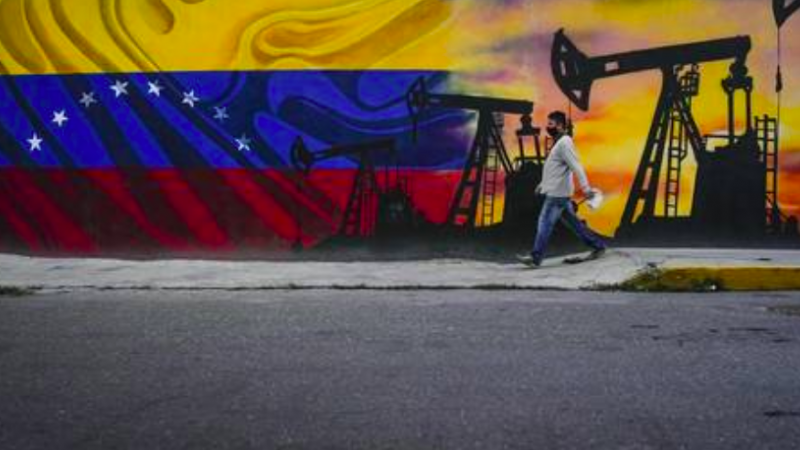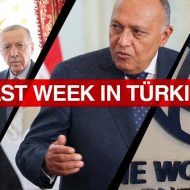By Úrsula Asta and Fernando Esteche *
The military escalation of the Israeli occupation war in Palestine, coupled with the increasing synergistic cooperation among major oil-producing countries, primarily those in the Persian Gulf, compel imperial powers to anticipate the resolution of supply chains and sustained energy supply.
The punitive sanctions on Venezuela were initially imposed by the Trump-Bolton duo, and later, with a change in approach in the United States, they were continued but used “reasonably” as a political pressure tool in the context of the customary U.S. confrontation with the Bolivarian government. This time, it’s about having resources that can balance potential uncertainties resulting from their intention of global redeployment.
Thus, the special Russian operation in Ukraine to denazify and prevent genocide played a significant role in reevaluating sanctions on Venezuelan oil production and trade. This has led the United States to seek alternatives to Russian oil, and Venezuela is a potential supplier of competitively priced oil.
Simultaneously, the Israeli escalation in Palestine and its disregard for minimal international conventions have caused a retraction of Arab countries regarding the roadmaps for reestablishing diplomatic relations with Israel. The well-known Abraham Accords are being overshadowed with each white phosphorus bomb dropped on Palestinian children, hospitals, and residential buildings in Gaza and the West Bank.
The American dream of a network of infrastructure corridors, both land and sea, penetrating deep into Asia, South Asia, and the Middle East, where harmonious, orderly, and predictable coexistence was needed, was being pursued with Turkey, Saudi Arabia, the United Arab Emirates, and others. However, this has become an impossible dream in the short term.
This sought to contrast with the strategy of mutual cooperation that the China-Russian axis has been developing, leading to the normalization and increasing relationships between Iran and Saudi Arabia, as well as different Gulf countries renouncing their participation in non-NATO militarism devices (e.g., UAE).
The expansion of BRICS, including the main oil suppliers and buyers, as well as the countries that control the Strait of Hormuz (a major choke point for global energy flow), outlines and consolidates a strategy for pacifying the region.
Thus, Netanyahu’s unrestrained militarism only serves him, jeopardizing the expectations of major powers, regional powers, and countries in the region.
Moreover, it complicates the other crucial global choke point (the Suez Canal) by directly involving Egypt in this bellicose escalation. Currently, there are Zionist bombings on Egyptian territory bordering Palestine. The closure of energy transportation through the Suez Canal significantly increases the logistics and transportation costs of global energy.
Reports revealing economic impacts of the situation between Israel and Palestine support the idea of an increase in oil prices, also explained by the risk of a further escalation and, in that case, the involvement of Iran, which contributes to the global oil supply. Additionally, Iran controls the aforementioned Strait of Hormuz, a maritime route through which oil from Iraq, Kuwait, Saudi Arabia, the UAE, Qatari gas, and liquefied natural gas transit.
In the region, not only do state powers operate, but various actors, especially Hezbollah from Lebanon, as well as other groups from Syria, Iraq, or Yemen, can respond to Israel’s fierce offensive in Gaza. Any event that compromises all the described trade has direct geopolitical implications for energy assets.
Thus, it becomes clear that the militaristic escalation negates the aspiration for increased production by Gulf countries, which could lower the cost of oil barrels, and also jeopardizes sustained energy supply.
This is where the importance of the Venezuelan oil basin comes into play regarding global geopolitical needs. It combines savvy diplomacy by Caracas and the clear entrapment and fatigue of American expansionist diplomacy.
With the lifting of sanctions on Venezuela, which currently produces around 800,000 barrels per day, its oil production could increase by 25 percent, according to Bloomberg estimates. This additional production could immediately address potential price crises and ensure the sustainability of European market supply that was won from Russia due to the proxy war in Ukraine.
In 1973, during the Yom Kippur War, OPEC halted oil production and imposed an embargo on oil supplies to the United States, the United Kingdom, Canada, Japan, and the Netherlands due to their support for Israel. The price of oil almost tripled, there were supply shortages that accelerated economic recession. Kissinger intervened with the Saudi king to prevent the use of oil as a weapon. These are notes to keep on the table even in a world that is different, very different, from 1973.
From this perspective, the lifting of sanctions against Venezuela and the importance of Guyana, where significant deposits were found in the Esequibo region claimed by Venezuela, could be understood. Regardless of the United States seeking to manage the internal costs of reaching an agreement with the Venezuelan government, its rapprochement has economic motivations, elements related to the migration crisis generated by its own blockades, and geopolitical reasons.
Having resolutions in the supply chain and sustained energy supply, which could be disrupted by Israel’s proposed widespread war, becomes imperative for the survival of capitalist powers.
* Úrsula Asta is a journalist, graduate of Institutional Relations, with a postgraduate degree in Public Policies for Equality in Latin America and the Caribbean. She is a member of the Radio Graphic Cooperative and radio host. Fernando Esteche is PhD in Social Communication (UNLP), full professor of International Relations (FPyCS – UNLP), professor of Contemporary Latin American History at the University of Plata, Buenos Aires and the director of PIA Global.









Leave a Reply